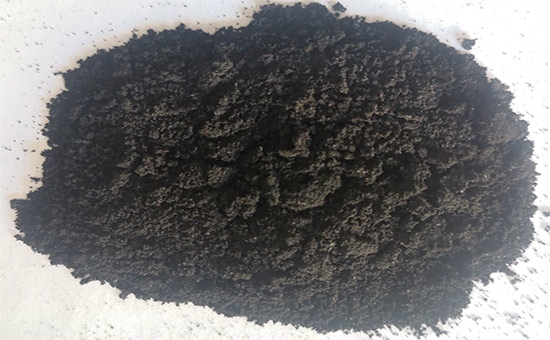
Stacked waste tires are difficult to degrade naturally, not only occupying space and breeding bacteria, but also easily burn and catch fire during stacking, and a large amount of harmful substances such as sulfur dioxide will be generated during the combustion process. At present, processing waste tires into tire rubber powder is the main way of recycling waste tires. In-depth research on the application of tire rubber powder in rubber products can solve some of the solid waste pollution. Waste tire rubber powder is widely used in styrene-butadiene rubber / butadiene rubber. The fineness of rubber powder affects the performance of styrene-butadiene rubber / cis rubber.
When the same amount of tire rubber powder with different fineness is blended in styrene-butadiene rubber / butadiene rubber, the tire rubber powder is mixed in a combined rubber differently. In theory, the higher the fineness of the tire rubber powder, the smaller the impact on the performance of the combined rubber, the closer the various indicators are to the rubber compound without vulcanized rubber powder.
1. The finer the tire rubber powder, the more it can improve the SBR / SBR index.
Adding a proper amount of tyre rubber powder (about 20-50 parts) to styrene-butadiene rubber / butadiene rubber can improve the tear strength of styrene-butadiene rubber / cis butadiene rubber. In general, when 30-40 parts of 80-200 mesh tire rubber powder is added, the styrene butadiene rubber / butadiene rubber and the rubber compound tear strength 2LLYY0331 is significantly improved. When an appropriate amount of 40-60 mesh tire rubber powder is added, the rubber material tears. The strength is basically the same as that of styrene-butadiene rubber / cis butadiene rubber without adding rubber powder.
The use of tire rubber powder can significantly improve the fatigue resistance and crack growth resistance of the rubber. The finer the tire rubber powder, the better the fatigue resistance (including tensile strength and bending fatigue) of the rubber. After adding about 200 mesh tire rubber powder, the fatigue resistance and crack growth resistance can be increased by more than 3 times; adding 30-50 mesh tire rubber powder, bending fatigue of styrene-butadiene rubber, butadiene rubber and no rubber powder rubber compound Roughly, tensile fatigue and crack growth were significantly improved.
2. The finer the tire rubber powder, the smaller the impact on the SBR / SBR index.
In general, when styrene butadiene rubber / butadiene rubber is mixed with tire mesh powder of more than 80 mesh (such as 80 mesh, 90 mesh, 120 mesh, or 200 mesh), the styrene butadiene rubber / butadiene rubber is used at 300%. The changes in elongation hardness and tensile strength are not more than 1 MPa compared with the combined rubber without added rubber, and the tear strength has decreased, but the change is not particularly large; 30-30 parts of 200 mesh superfine tire rubber powder is added, 300% fixed elongation hardness and tensile strength are almost unchanged; the addition of tire rubber powder has almost no effect on the resilience and hardness of the styrene-butadiene rubber / butadiene rubber compound.
The scope of application of synthetic rubber such as styrene butadiene rubber and butadiene rubber in the rubber industry is getting wider and wider. Further expanding the application range of tire rubber powder in styrene butadiene rubber / butadiene rubber can consume more waste tires, not only reducing rubber products Production costs, improved rubber properties, and can effectively alleviate "black pollution".
Exclusive original article [commercial authorization] reprint, excerpt and excerpt in any form are prohibited without written authorization. Focus on Hongyun rubber: learn the process formula and raw material technology of producing rubber products from recycled rubber to help you reduce costs and increase profits